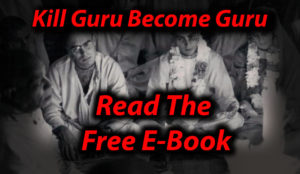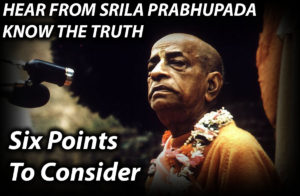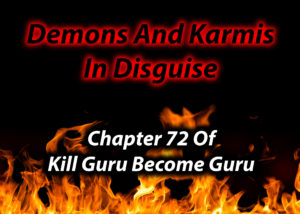Srila Prabhupada warns about many envious persons in the garb of Vaishnavas in his society
Srila Prabhupada says:
“There are many jealous people in the dress of Vaiṣṇavas in this Kṛṣṇa consciousness movement, and they should be completely neglected.”
“Śrīla Narottama dāsa Ṭhākura says, chāḍiyā vaiṣṇava sevā nistāra pāyeche kebā: unless one serves a Vaiṣṇava, he cannot be delivered. The spiritual master initiates the disciple to deliver him, and if the disciple executes the order of the spiritual master and does not offend other Vaiṣṇavas, his path is clear. Consequently Śrī Caitanya Mahāprabhu requested all the Vaiṣṇavas present to show mercy toward the two brothers, Rūpa and Sanātana, who had just been initiated by the Lord. When a Vaiṣṇava sees that another Vaiṣṇava is a recipient of the Lord’s mercy, he becomes very happy. Vaiṣṇavas are not envious. If a Vaiṣṇava, by the mercy of the Lord, is empowered by Him to distribute the Lord’s holy name all over the world, other Vaiṣṇavas become very joyful-that is, if they are truly Vaiṣṇavas. One who is envious of the success of a Vaiṣṇava is certainly not a Vaiṣṇava himself, but an ordinary mundane man. Envy and jealousy are manifested by mundane people, not by Vaiṣṇavas. Why should a Vaiṣṇava be envious of another Vaiṣṇava who is successful in spreading the holy name of the Lord? An actual Vaiṣṇava is very pleased to accept another Vaiṣṇava who is bestowing the Lord’s mercy. A mundane person in the dress of a Vaiṣṇava should not be respected but rejected. This is enjoined in the śāstra (upekṣā). The word upekṣā means neglect. One should neglect an envious person. A preacher’s duty is to love the Supreme Personality of Godhead, make friendships with Vaiṣṇavas, show mercy to the innocent and reject or neglect those who are envious or jealous. There are many jealous people in the dress of Vaiṣṇavas in this Kṛṣṇa consciousness movement, and they should be completely neglected. There is no need to serve a jealous person who is in the dress of a Vaiṣṇava. When Narottama dāsa Ṭhākura says chāḍiyā vaiṣṇava sevā nistāra payeche kebā, he is indicating an actual Vaiṣṇava, not an envious or jealous person in the dress of a Vaiṣṇava.”
Sri Caitanya-caritamrta – 1975 Edition – Madhya-lila 1.218 Purport
“…pseudo devotees or nondevotees in the Kṛṣṇa Consciousness Society…”
“If one thinks that there are many pseudo devotees or nondevotees in the Kṛṣṇa Consciousness Society, one can keep direct company with the spiritual master, and if there is any doubt, one should consult the spiritual master. However, unless one follows the spiritual master’s instructions and the regulative principles governing chanting and hearing the holy name of the Lord, one cannot become a pure devotee. By one’s mental concoctions, one falls down. By associating with nondevotees, one breaks the regulative principles and is thereby lost.”
Sri Caitanya-caritamrta – 1975 Edition – Madhya 19.157 : Purport
“…the entire mission was defeated. We are not proud of this; however, the truth must be explained.”
“A person who cannot keep his faith in the words of his spiritual master but acts independently never receives the authority to chant the holy name of the Lord. It is said in the Vedas (Śvetāśvatara Upaniṣad 6.23):
yasya deve parā bhaktir
yathā deve tathā gurau
tasyaite kathitā hy arthāḥ
prakāśante mahātmanaḥ
“Only unto those great souls who have implicit faith in both the Lord and the spiritual master are all the imports of Vedic knowledge automatically revealed.” This Vedic injunction is very important, and Śrī Caitanya Mahāprabhu supported it by His personal behavior. Believing in the words of His spiritual master, He introduced the saṅkīrtana movement, just as the present Kṛṣṇa consciousness movement was started with belief in the words of our spiritual master. He wanted to preach, we believed in his words and tried somehow or other to fulfill them, and now this movement has become successful all over the world. Therefore faith in the words of the spiritual master and in the Supreme Personality of Godhead is the secret of success. Śrī Caitanya Mahāprabhu never disobeyed the orders of His spiritual master and stopped propagating the saṅkīrtana movement. Śrī Bhaktisiddhānta Sarasvatī Gosvāmī, at the time of his passing away, ordered all his disciples to work conjointly to preach the mission of Caitanya Mahāprabhu all over the world. Later, however, some self-interested, foolish disciples disobeyed his orders. Each one of them wanted to become head of the mission, and they fought in the courts, neglecting the order of the spiritual master, and the entire mission was defeated. We are not proud of this; however, the truth must be explained. We believed in the words of our spiritual master and started in a humble way-in a helpless way-but due to the spiritual force of the order of the supreme authority, this movement has become successful.”
Sri Caitanya-caritamrta – 1975 Edition – Adi-lila 7.95-96
“…pseudo spiritual masters…the most dangerous elements in human society…heading toward the most obnoxious place in the universe after the completion of their spiritual master business.”
“The lord states that as soon as one reaches him by devotional service–which is the one and only way to approach the personality of godhead–one attains complete freedom from the bondage of birth and death. In other words, the path of salvation from the material clutches fully depends on the principles of knowledge and detachment gained from serving the lord.
The pseudo religionists have neither knowledge nor detachment from material affairs, for most of them want to live in the golden shackles of material bondage under the shadow of philanthropic activities disguised as religious principles. By a false display of religious sentiments, they present a show of devotional service while indulging in all sorts of immoral activities. In this way they pass as spiritual masters and devotees of god.
Such violators of religious principles have no respect for the authoritative acaryas, the holy teachers in the strict disciplic succession. They ignore the vedic injunction acaryopasana–“one must worship the acarya”–and krsna’s statement in the bhagavad-gita (4.2) evam parampara-praptam, “this supreme science of god is received through the disciplic succession.” Instead, to mislead the people in general they themselves become so-called acaryas, but they do not even follow the principles of the acaryas.
These rogues are the most dangerous elements in human society. Because there is no religious government, they escape punishment by the law of the state. They cannot, however, escape the law of the supreme, who has clearly declared in the bhagavad-gita that envious demons in the garb of religious propagandists shall be thrown into the darkest regions of hell (bg. 16.19-20).
Sri isopanisad confirms that these pseudo religionists are heading toward the most obnoxious place in the universe after the completion of their spiritual master business, which they conduct simply for sense gratification.“
Sri Isopanisad 12
“beware of self-interested people after personal aggrandizement who deviate others from the actual path”
“A bona fide spiritual master is in the disciplic succession from time eternal, and he does not deviate at all from the instructions of the supreme lord as they were imparted millions of years ago to the sun-god, from whom the instructions of bhagavad-gita have come down to the earthly kingdom. One should, therefore, follow the path of bhagavad-gita as it is expressed in the gita itself and beware of self-interested people after personal aggrandizement who deviate others from the actual path. The lord is definitely the supreme person, and his activities are transcendental. One who understands this is a liberated person from the very beginning of his study of the gita.”
Bhagavad-gita As It Is (Original, Unrevised) 4.42 Purport: transcendental knowledge
Srila Bhaktivinoda Thakura further instructs:
“if the disciple unknowingly associates with these pretenders then his spiritual life is ruined”
“One should compulsorily engage in endeavouring to trying to uplift the Vaisnava-dharma from the mud of contamination and trying to free it from all kinds of dauratmya (wrong ideas and practices).”[ii]
“When the disciple prayerfully inquires from the spiritual master about the identity of true Vaisnavas, the guru may point out persons who are dressed as Vaisnavas but are not following the Vaisnava principles (sadacara), and name them as ‘avaisnavas’. This action on the part of the guru is for the benefit of the disciple (because if the disciple unknowingly associates with these pretenders then his spiritual life is ruined) and for the benefit of the whole world (when the pretenders are identified, the sanctity of the pure Vaisnava-dharma is protected in the world). The bonafide guru does not do so because of envy or malice towards any individual but he acts for the benefit of everyone. Thus it is not ‘sadhu-ninda’ (criticism of devotees) or ‘vaisnava-aparadha’ (offense to the devotees) to instruct others to reject the association of those pretenders (dharmadhvajis) who have taken shelter of the exalted position of Vaisnavas but are engaged in performing activities against the Vedic scriptures.”[iii]
i From the Great Favor, a Harmonist article
ii Bheka-dharana, Sajjana Tosani
iii Vaisnava-ninda, Sajjana Tosani
Srila Bhaktisiddhanta Sarasvati‘s Gaudiya Matha mission:
“The material opulences a person obtains by offering prayers to the goddess Durgā are temporary. As described in Bhagavad-gītā (7.23), antavat tu phalaṁ teṣāṁ tad bhavaty alpa-medhasām: men of meager intelligence desire temporary happiness. We have actually seen that one of the disciples of Bhaktisiddhānta Sarasvatī Ṭhākura wanted to enjoy the property of his spiritual master, and the spiritual master, being merciful toward him, gave him the temporary property, but not the power to preach the cult of Caitanya Mahāprabhu all over the world. That special mercy of the power to preach is given to a devotee who does not want anything material from his spiritual master but wants only to serve him. The story of the demon Rāvaṇa illustrates this point. Although Rāvaṇa tried to abduct the goddess of fortune Sītādevī from the custody of Lord Rāmacandra, he could not possibly do so. The Sītādevī he forcibly took with him was not the original Sītādevī, but an expansion of māyā, or Durgādevī. As a result, instead of winning the favor of the real goddess of fortune, Rāvaṇa and his whole family were vanquished by the power of Durgādevī (sṛṣṭi-sthiti-pralaya-sādhana-śaktir ekā [Bs. 5.44]).”
Srimad Bhagavatam 5.18.22
Trying to take Srila Prabhupada’s place as the initiator guru – “shall everything be spoiled by GBC?”
“I am the Spiritual Master of this institution, and all the members of the Society, they’re supposed to be my disciples. They follow the rules and regulations which I ask them to follow, and they are initiated by me spiritually”
Srila Prabhupada Radio Interview, 12 March 1968, San Francisco
“The chanting of Hare Krishna is our main business, that is real initiation. And as you are all following my instruction, in that matter, the initiator is already there.” Letter — 19/8/68
“The newly initiated devotees are disciples of His Divine Grace A.C. Bhaktivedanta Swami Prabhupad, the above eleven senior devotees acting as His representative.” (July 9th Letter 1977 – final instruction by Srila Prabhupada on initiations in ISKCON)
“The GBC should all be the instructor gurus. I am the initiator guru, and you should be the instructor guru by teaching what I am teaching and doing what I am doing. This is not a title, but you must actually come to this platform. This I want.”
(Srila Prabhupada Letter, August 4th, 1975)
“Our mission is to serve bhakta-visesa and live with devotees. Not that you take the place of the guru. That is nonsense, very dangerous. Then everything will be spoiled. As soon as you become ambitious to take the place of guru—gurusu nara-matih. That is the material disease.” (Srila Prabhupada Conversation, April 20th, 1977)
“What will happen when I am not here, shall everything be spoiled by GBC?” (Srila Prabhupada Letter, April 11th, 1972)



